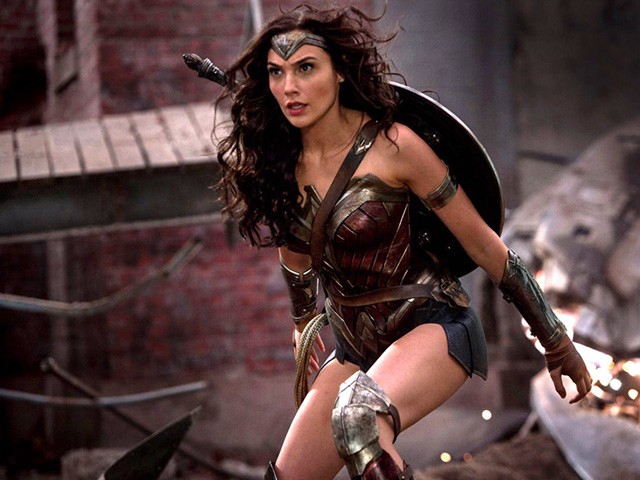The only news that would (or will) be bigger than Wonder Woman 1984 moving to streaming, to HBO Max, is if Marvel gives in and drops Black Widow on Disney Plus.
Wonder Woman 1984, a bona fide Warner Bros. tentpole, a highly-anticipated sequel to a monster blockbuster that grossed almost $900 million, is throwing in the towel and will premier on TV on Christmas Day.
It will take a run at international theaters starting December 16, and will open in theaters here on Christmas Day. But with Democrats locking the world down, how many domestic theaters are going to be open on Christmas Day? Not many. A whole lot fewer than were open when Warner Bros. dropped Christopher Nolan’s Tenet in late August, only to see that no-brainer blockbuster sputter and collapse with a $56 million domestic run, and $297 million international — which is about half a billion less than it would have grossed otherwise.
Tenet made sense. It was the canary in the coalmine. Someone had to go first to see if people would return to the movies. No one expected it to make $100 million on its opening weekend, which it probably would have in pre-pandemic days. That kind of opening would have been impossible with so many theaters closed and those that are open limiting seating in an effort to practice social distancing.
The question with Tenet was could it win the marathon. Instead of a pre-pandemic sprint, could Tenet hang in there for a couple months and make real money. Okay, we can’t fill theaters like we used to, we can’t have people sitting elbow to elbow, but will enough people come over time to make up for that? (the studio’s logic was).
Well, the answer is obviously LOL. I mean, $56 million domestic gross? Releasing Tenet was a catastrophe of red ink. With a $353 million worldwide gross, Warner Bros. lost a freakin’ fortune. Between production and promotion, Tenet probably cost $400 million, and after everyone took their cut of the box office, Warner probably only saw $200 million of the $353 million.
Watch below:
But NOW Warner Bros. is releasing Wonder Woman 1984? Now, after the Tenet catastrophe? Now, when lockdowns are restarting? Now, when director Patty Jenkins has repeatedly said she wanted this to hit theaters?
The question is not so much now as much as it is why?
The first thing you have to keep in mind is that there is nothing stopping Warner Bros. from sitting on Wonder Woman 1984 until things go back to normal. A buttload of blockbusters scheduled for 2020 have been moved well into next year. Why not Wonder Woman 1984? Why leave a billion dollars in worldwide box office on the table when you could collect it next year?
The answer should terrify anyone who doesn’t want to see movie theaters go the way of the dinosaur. The answer is streaming.
You see, Warner Bros. isn’t looking at this move as one that leaves a billion dollars in box office money on the table. Nope. Warner Bros. is looking at this as a move that, over time, delivers billions and billions of dollars.
You put your biggest title on HBO Max and what happens? Well, hopefully what happened when Disney Plus dropped Mulan and Hamilton on its streaming service: you pick up thousands, if not millions, of new subscribers.
Do the math…
Disney Plus has 195 million global subscribers paying roughly $7.00 per month. I’m sure prices vary according to country, but that’s the U.S. price and this is back of the envelope… That adds up to a monthly number so big my calculator just told me to kiss its ass. That’s every month! Every month, Disney Plus is reaping $KissMyAss.
HBO Max has about 30 million domestic subscribers and costs $14.99 a month.
So during the fiscal quarter when Mulan dropped on Disney Plus, 16.2 million new subscribers signed on for that service. Let’s be conservative and say 13 million were going to sign up anyway, but for the rest, Mulan was the reason they signed up. So 3.2 million signed on for Mulan.
Let’s again be conservative and say only two million will subscribe to HBO Max so they can see Wonder Woman 1984. If those two million stick for just six months, that’s $180 million in revenue for Warner Bros. It’s $360 million over the course of the year.
If just one million decide they like HBO Max and stick with it, we’re talking about a number the exceeds a billion dollars in less than five years.
When you buy a ticket to see Wonder Woman 1984, you pay $11 once. Once.
If you subscribe to HBO Max to see Wonder Woman 1984, you’re buying a $14.99 ticket every month.
Sure, HBO Max could drop Wonder Woman 1984 into HBO Max next year after its theatrical run, but by then it’s all used up, it’s old news. Who’s going to sign up for HBO Max for that? Anyone who is eager enough to sign up has already bought a ticket to see it in theaters.
This news about Wonder Woman 1984 isn’t about the pandemic, it’s about the math, it’s about where the real money is, and the real money is in the golden goose of streaming subscriptions.
Follow John Nolte on Twitter @NolteNC. Follow his Facebook Page here.
